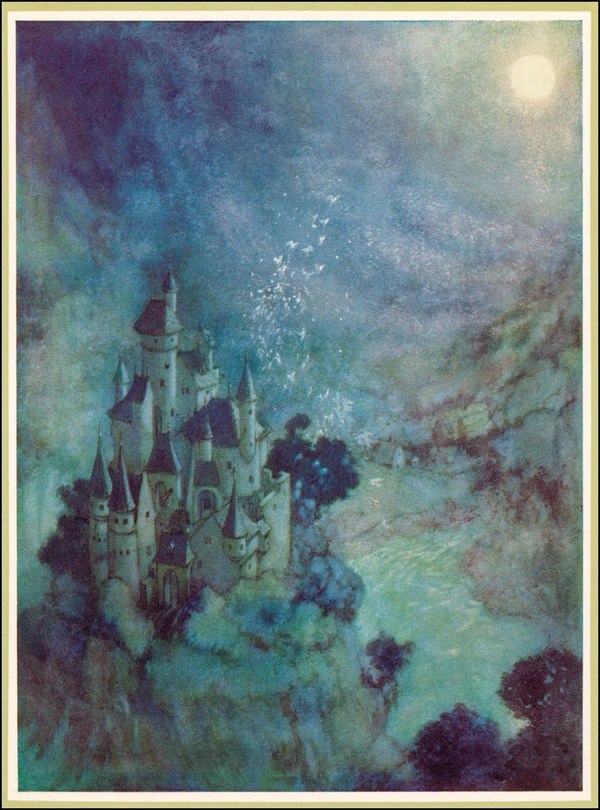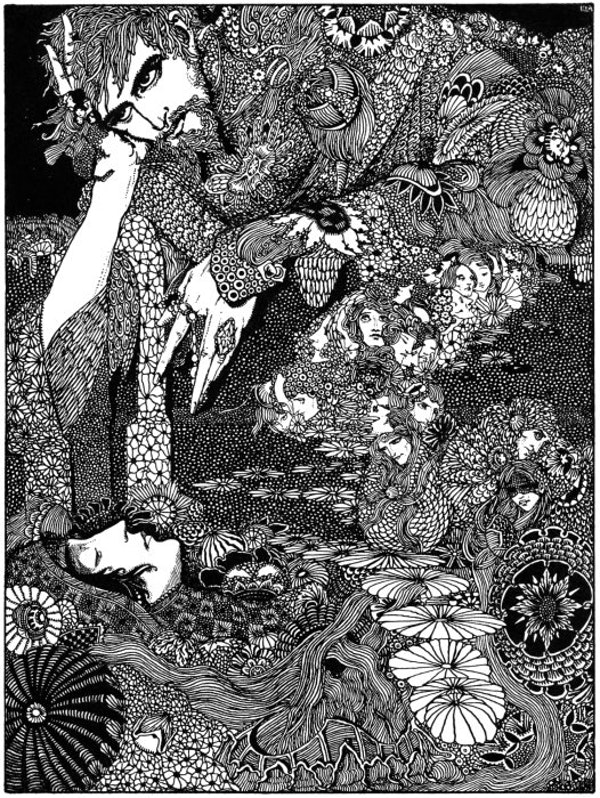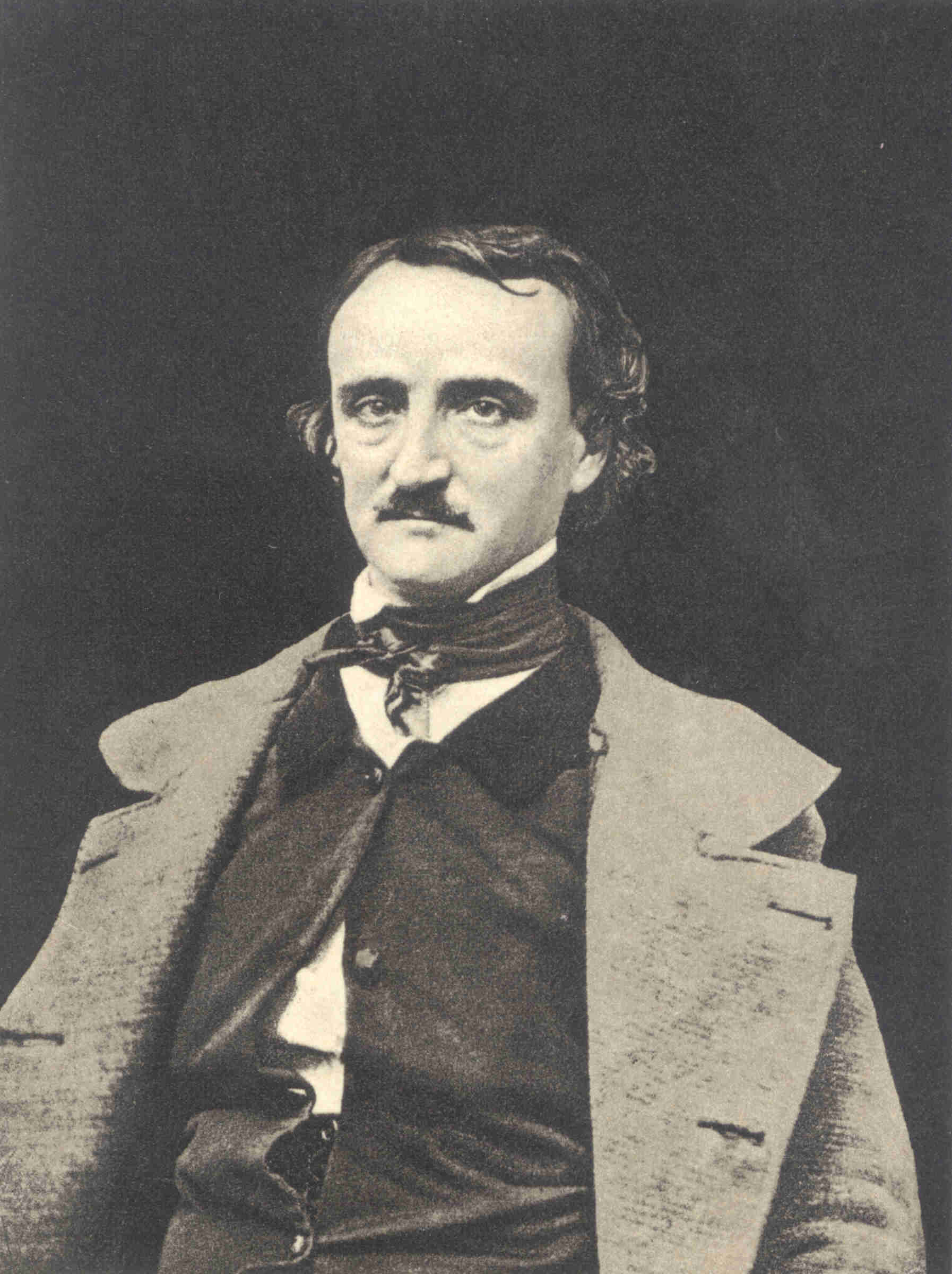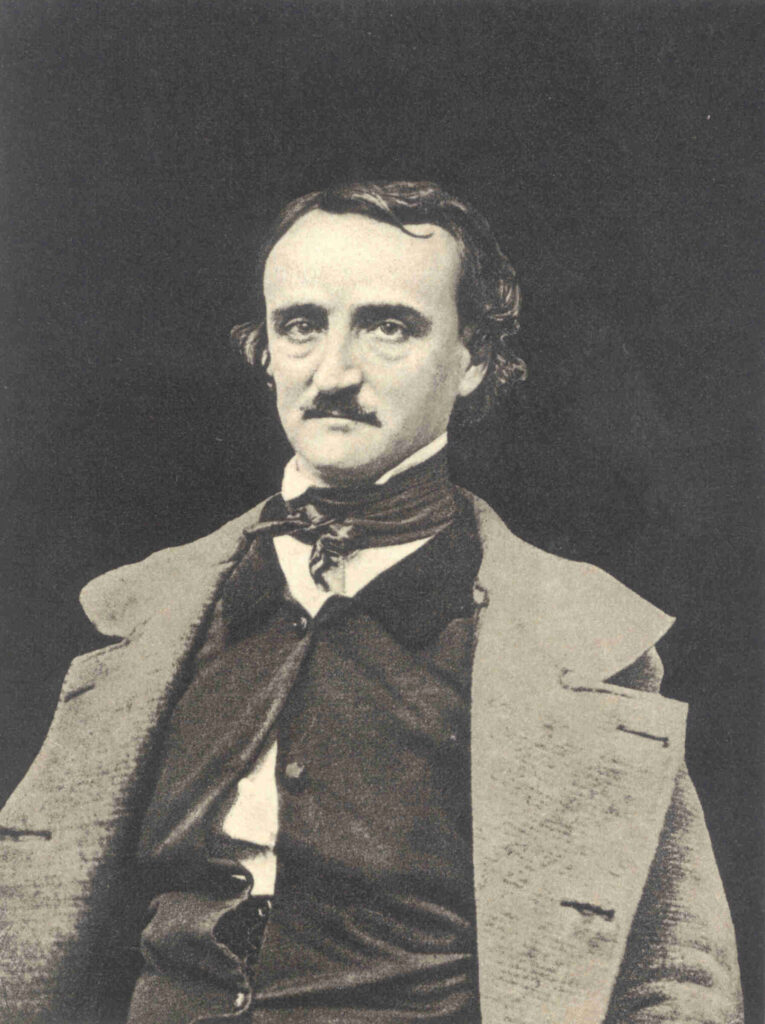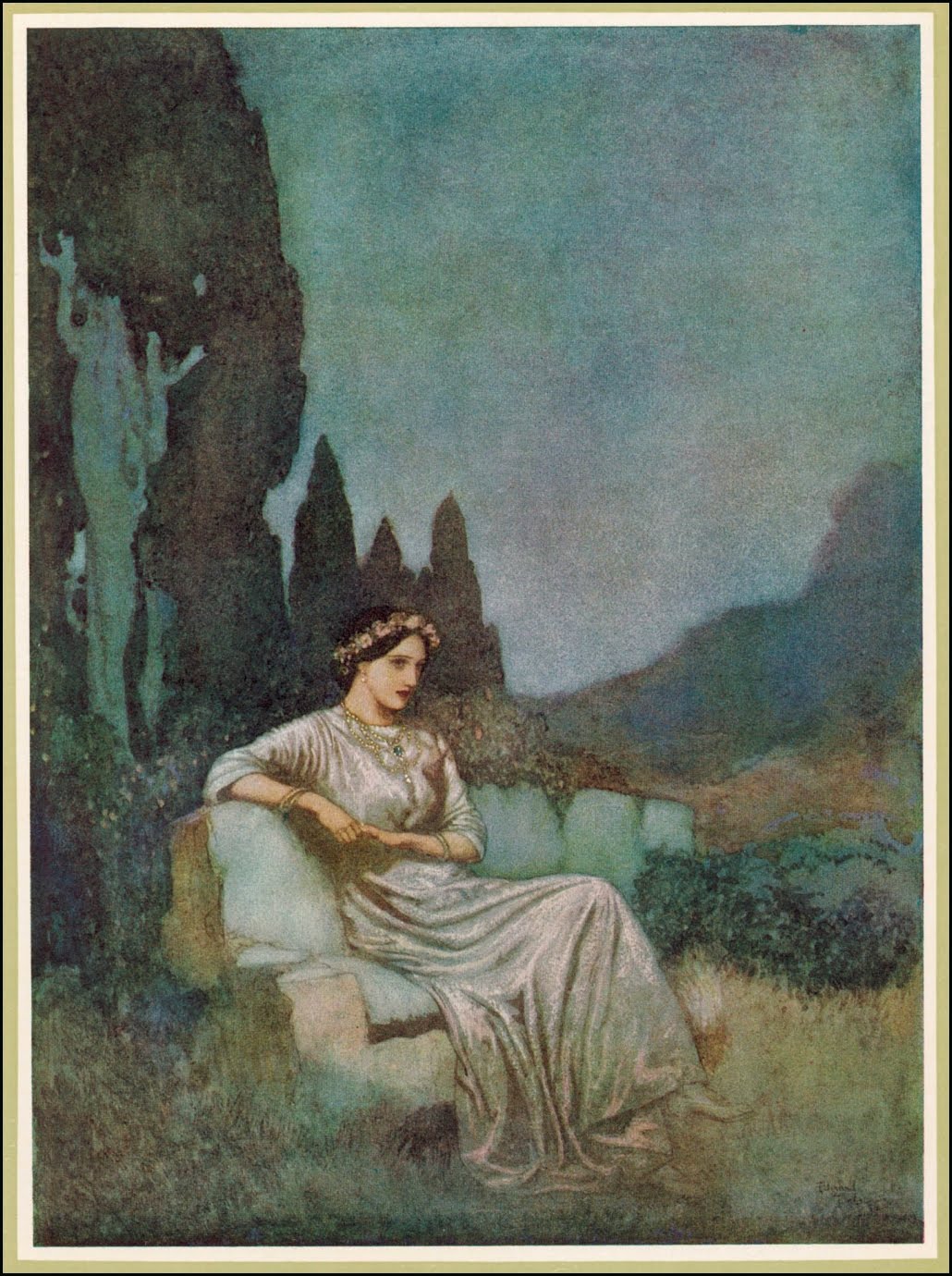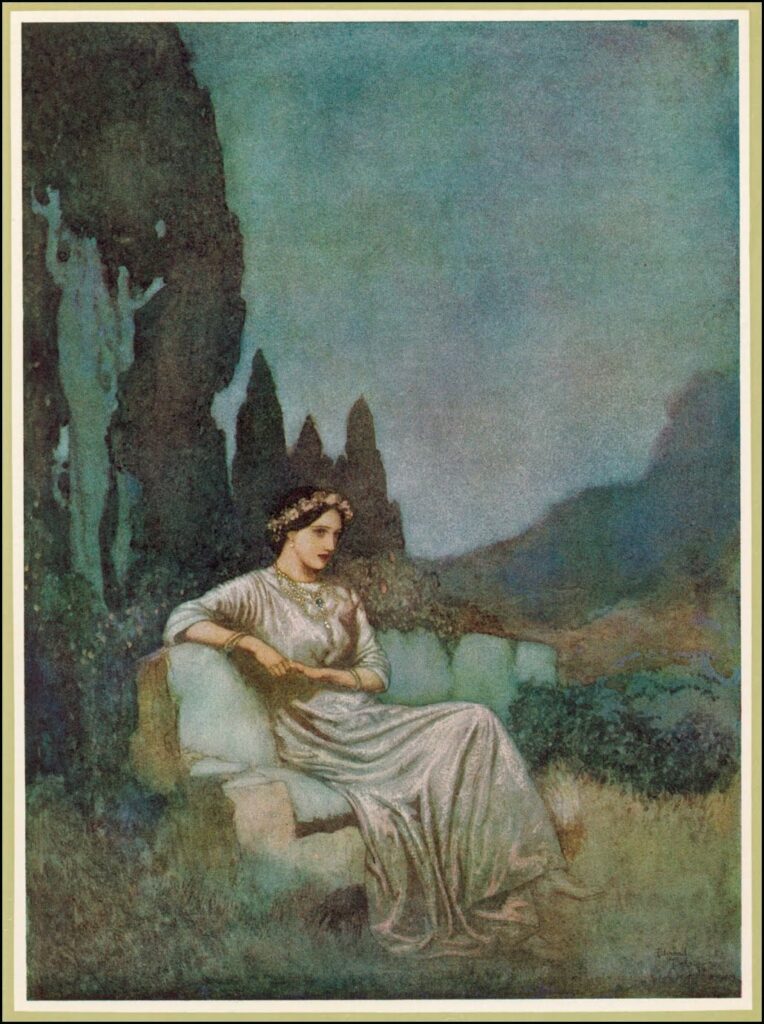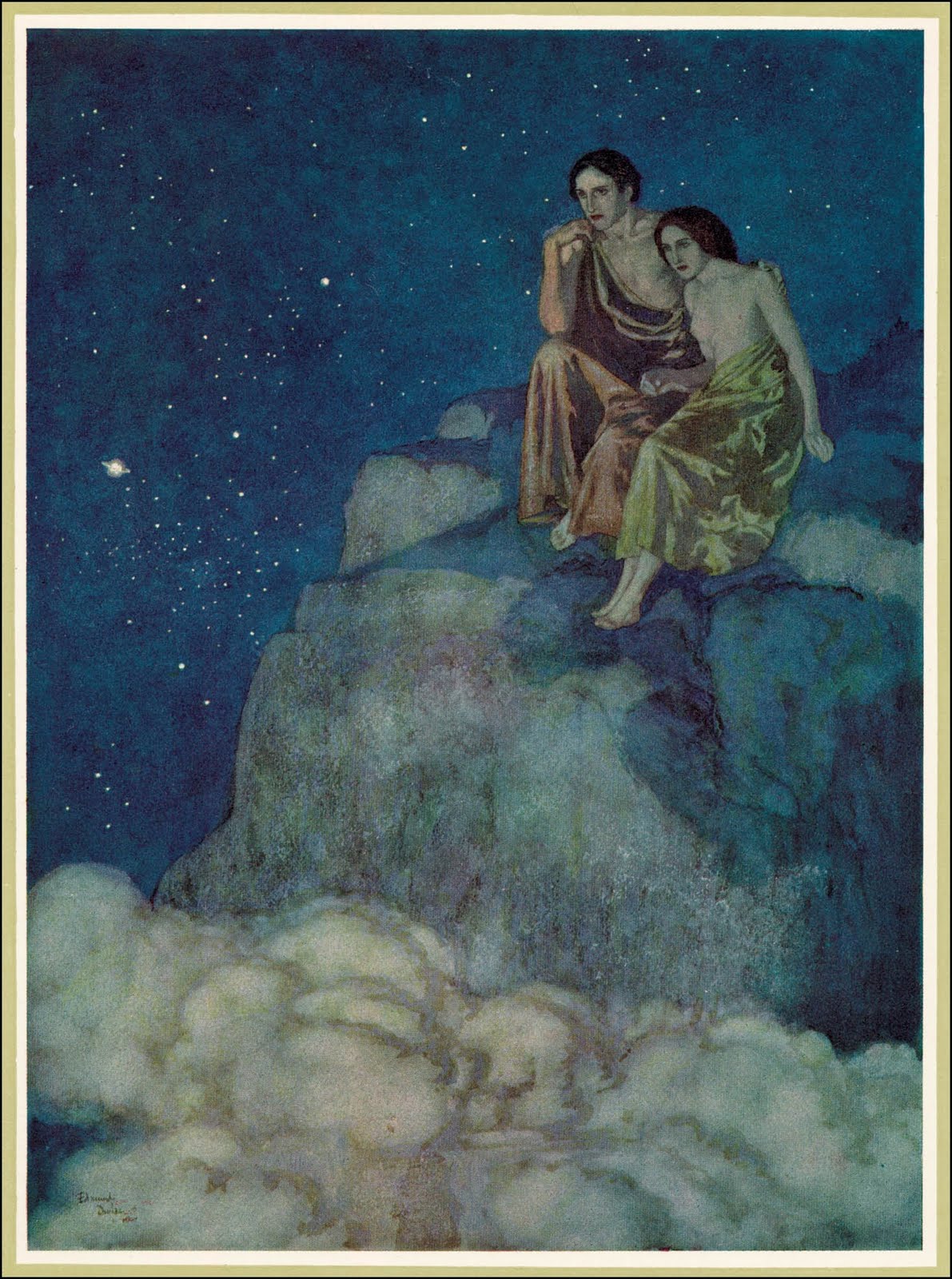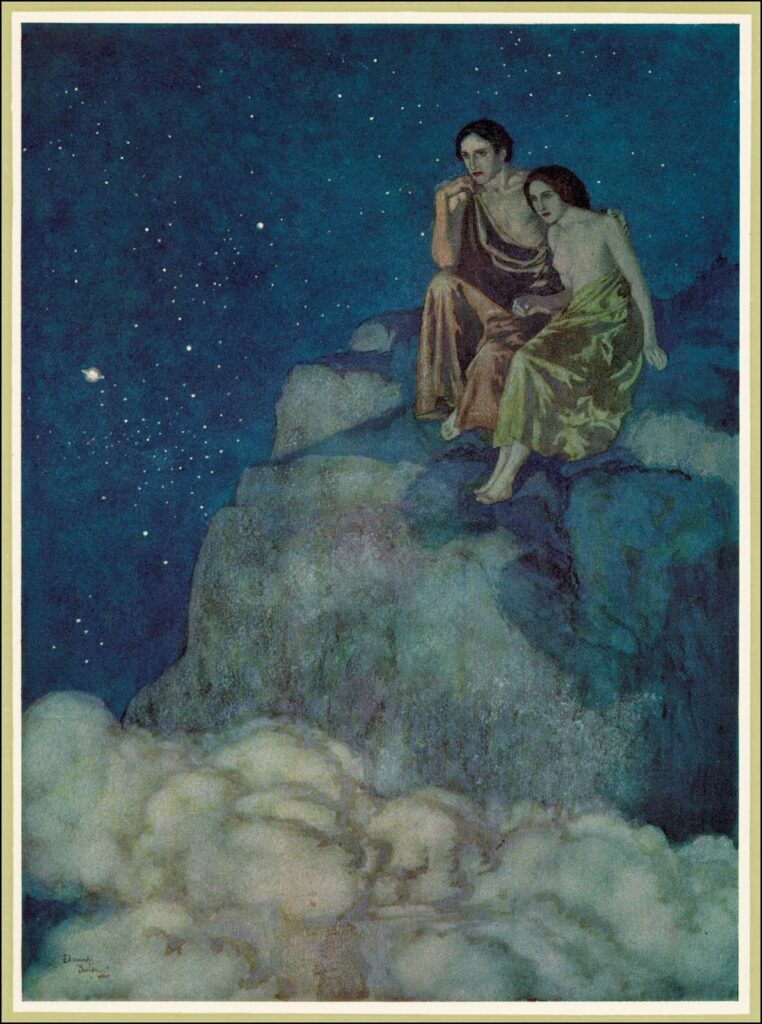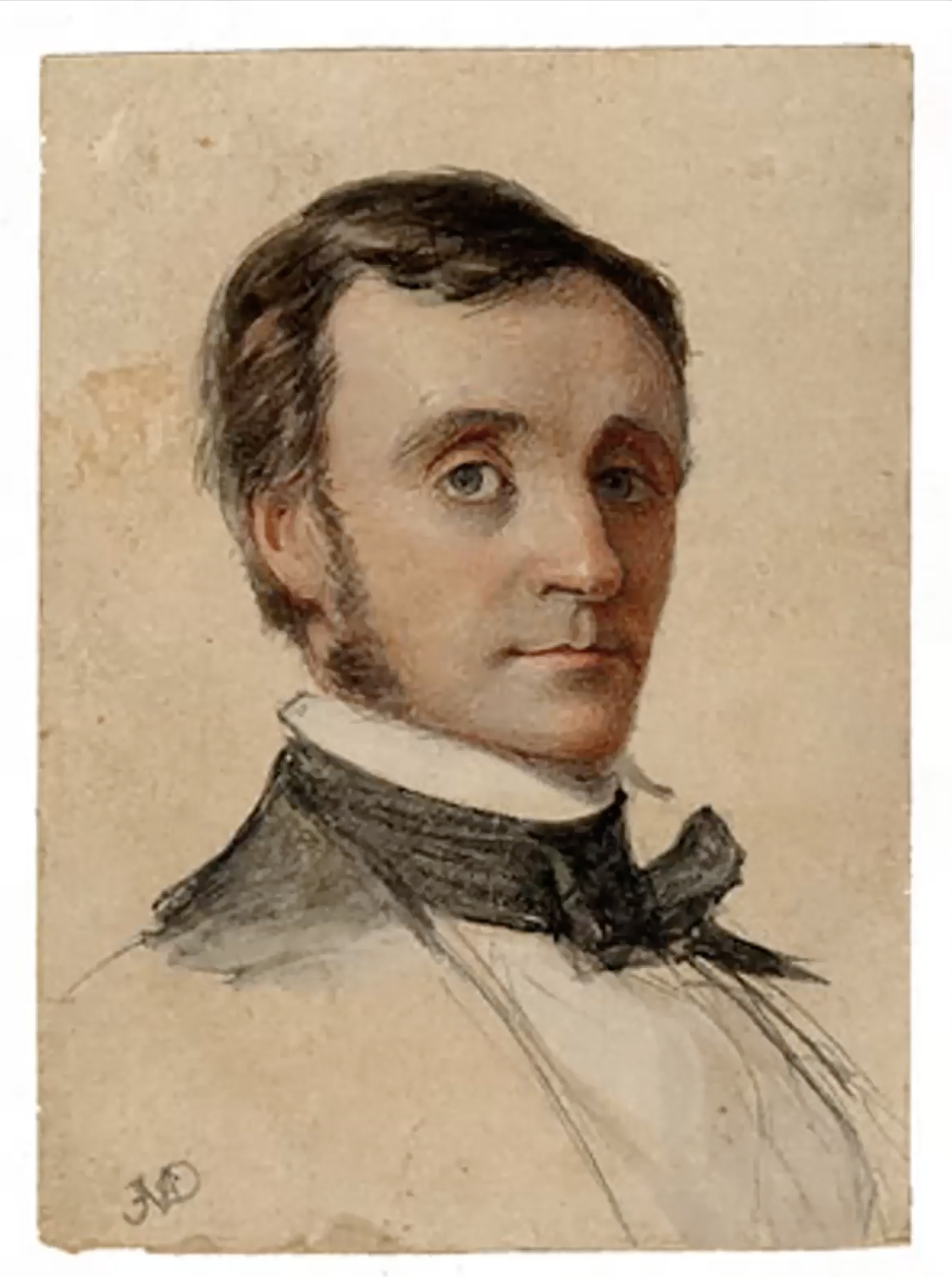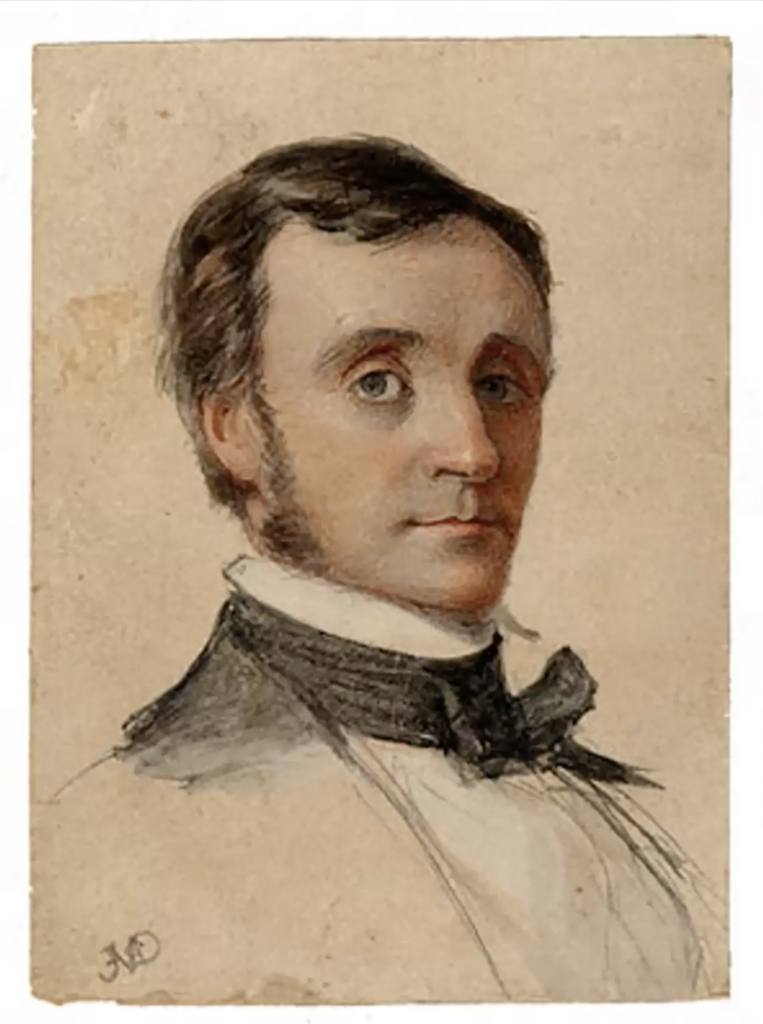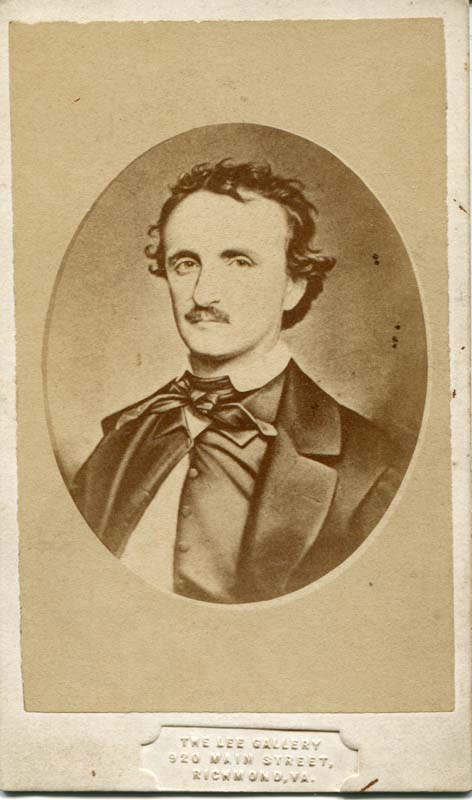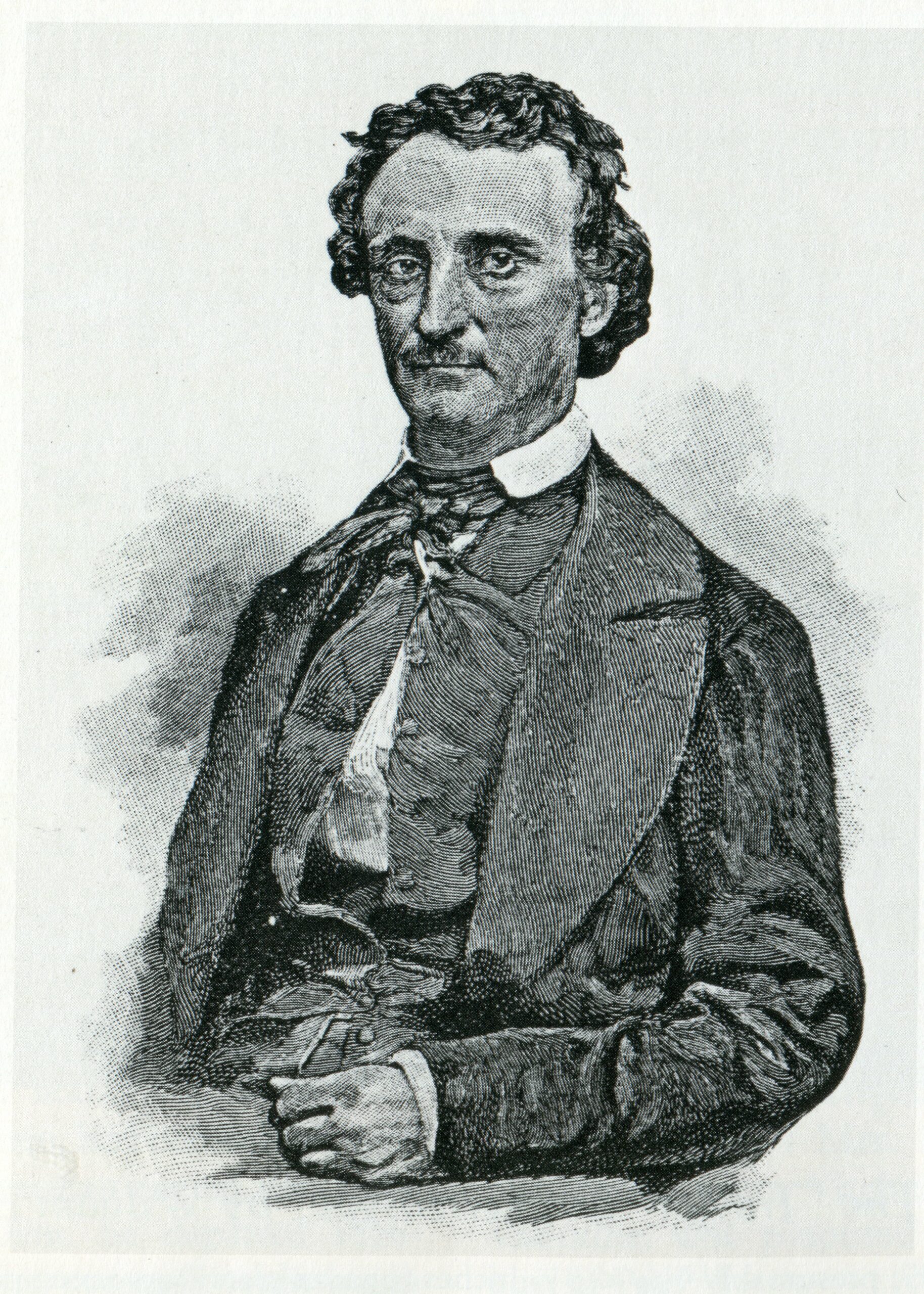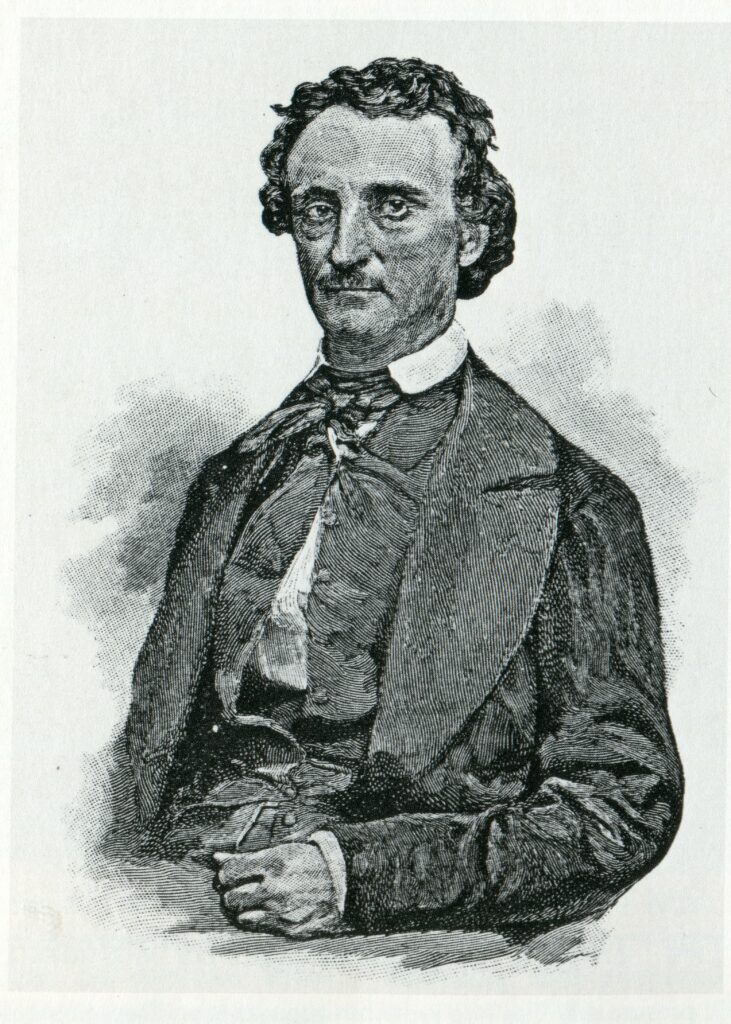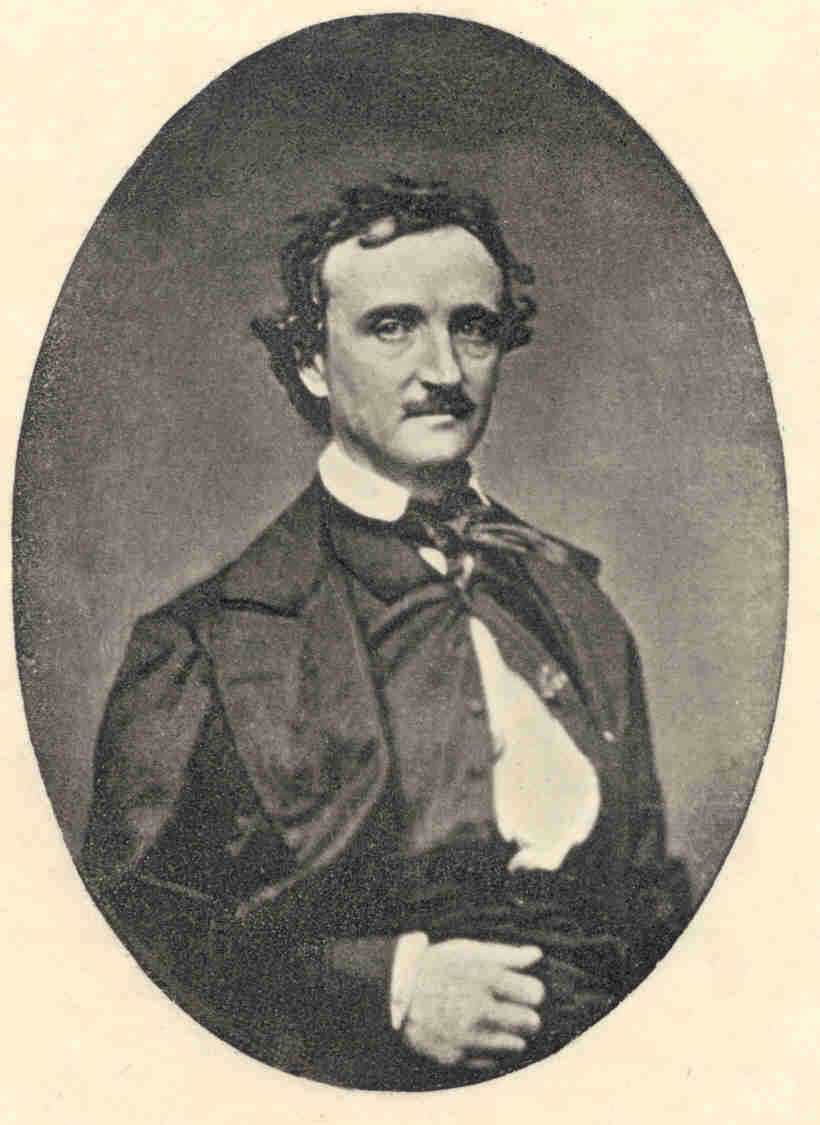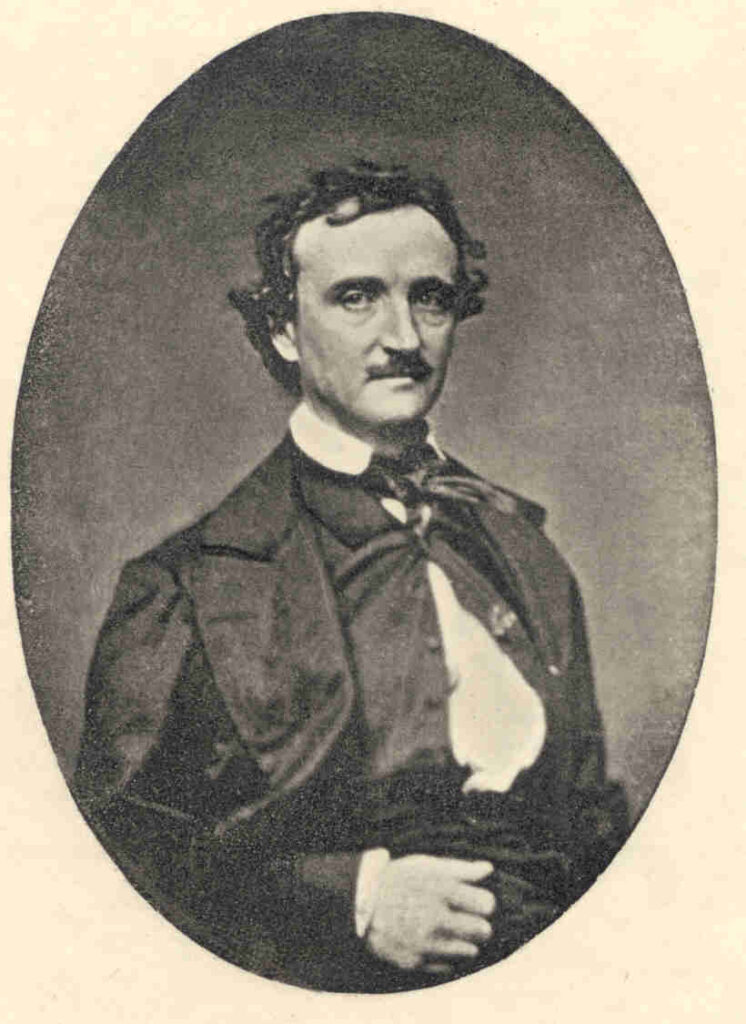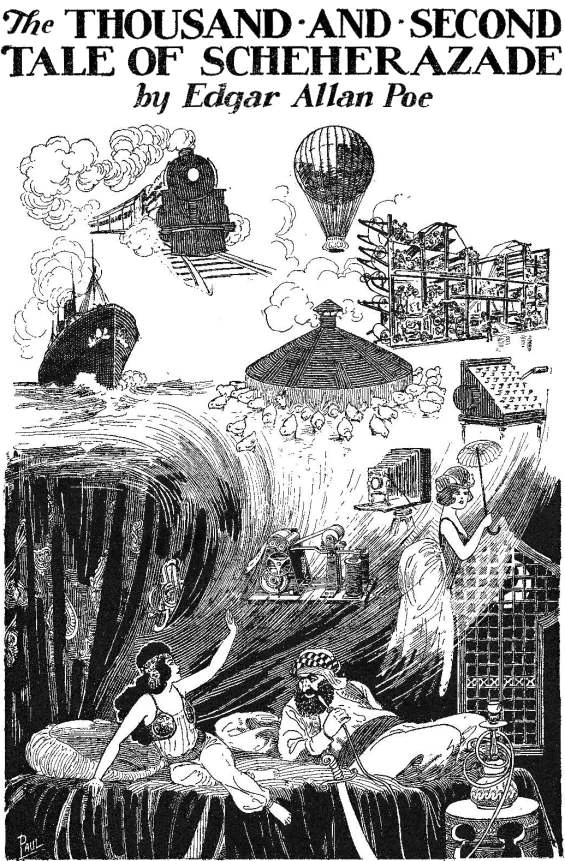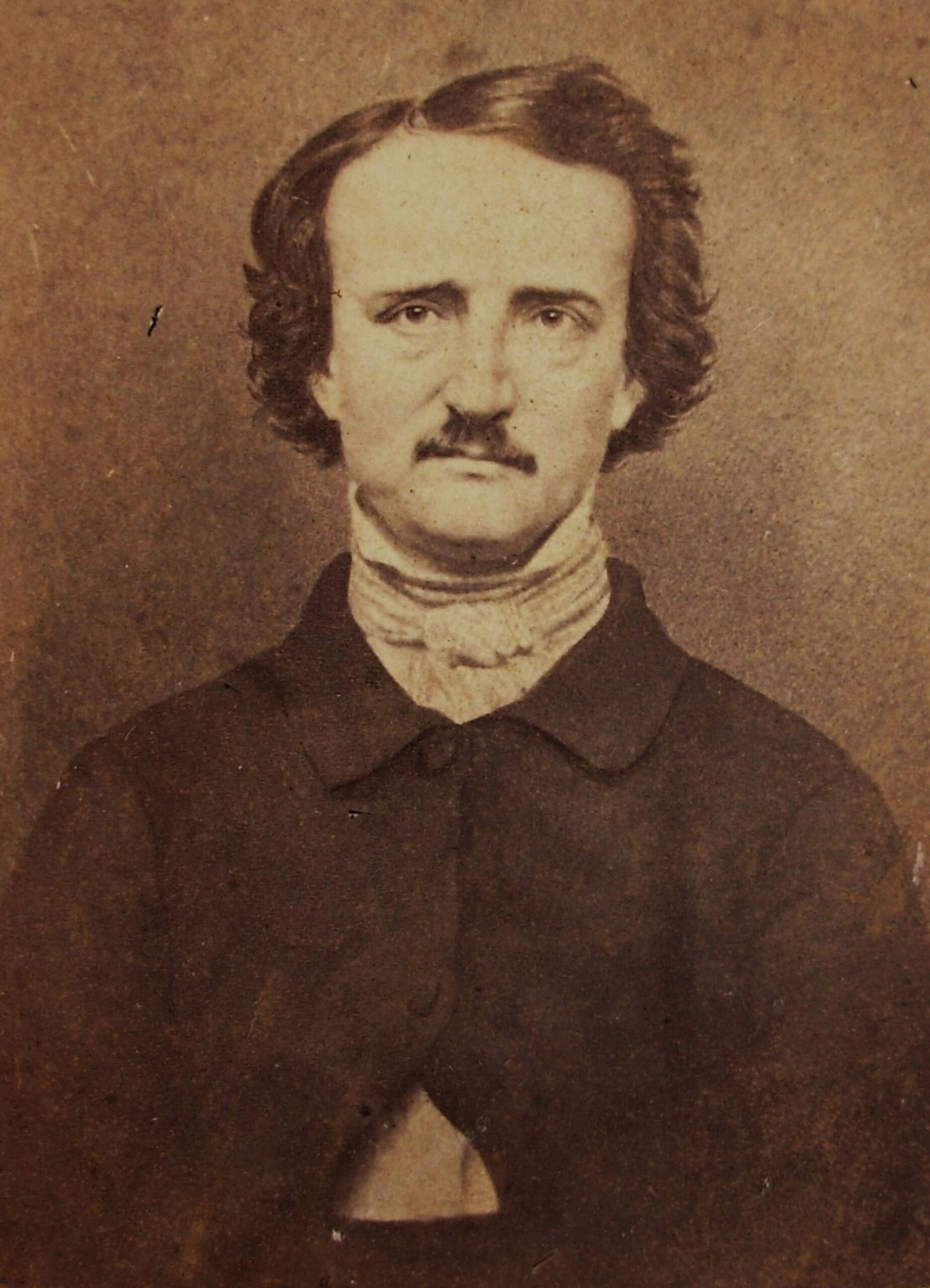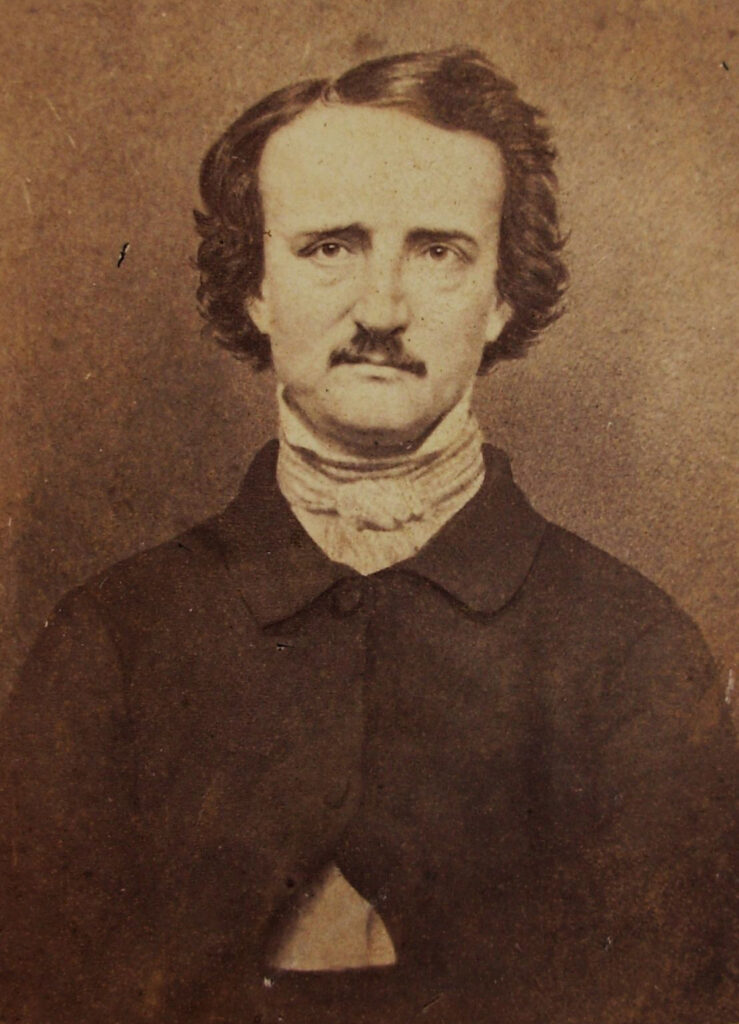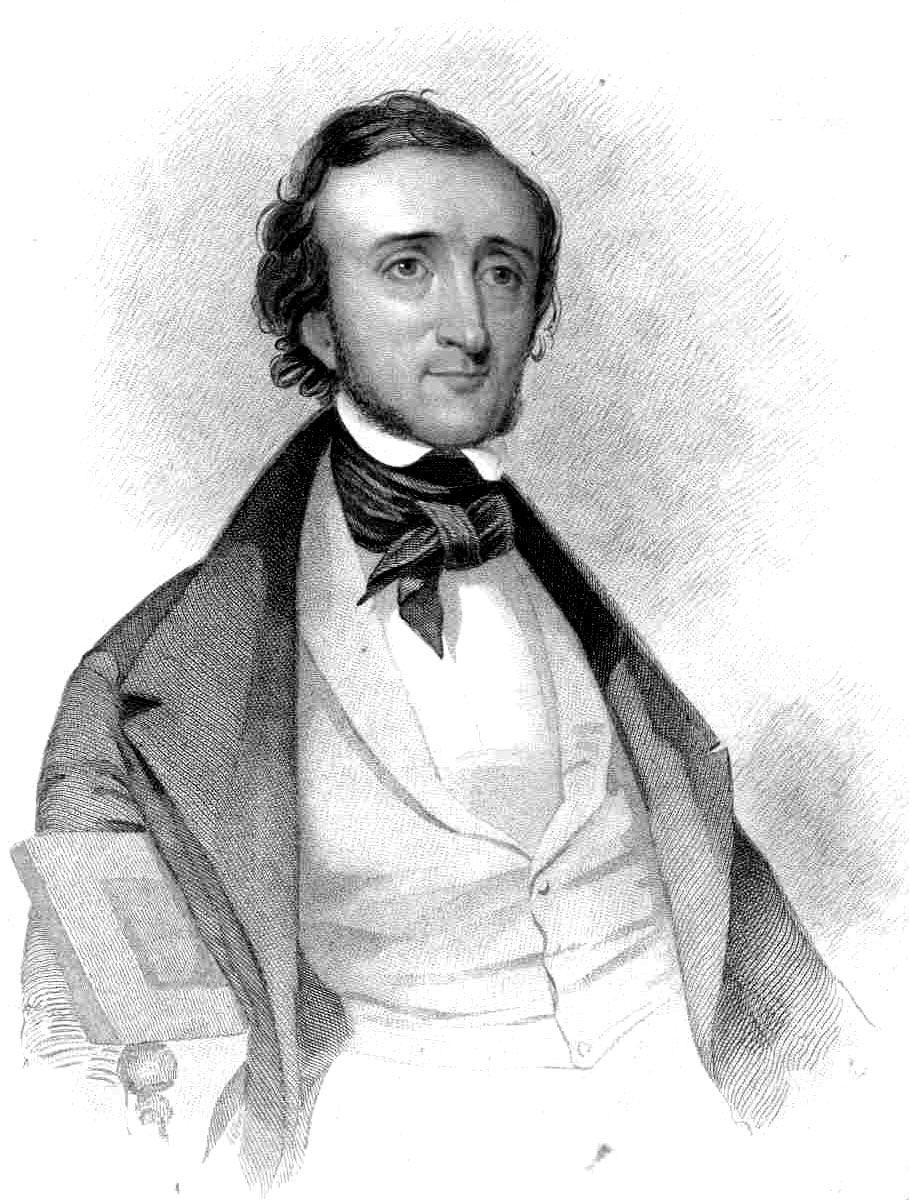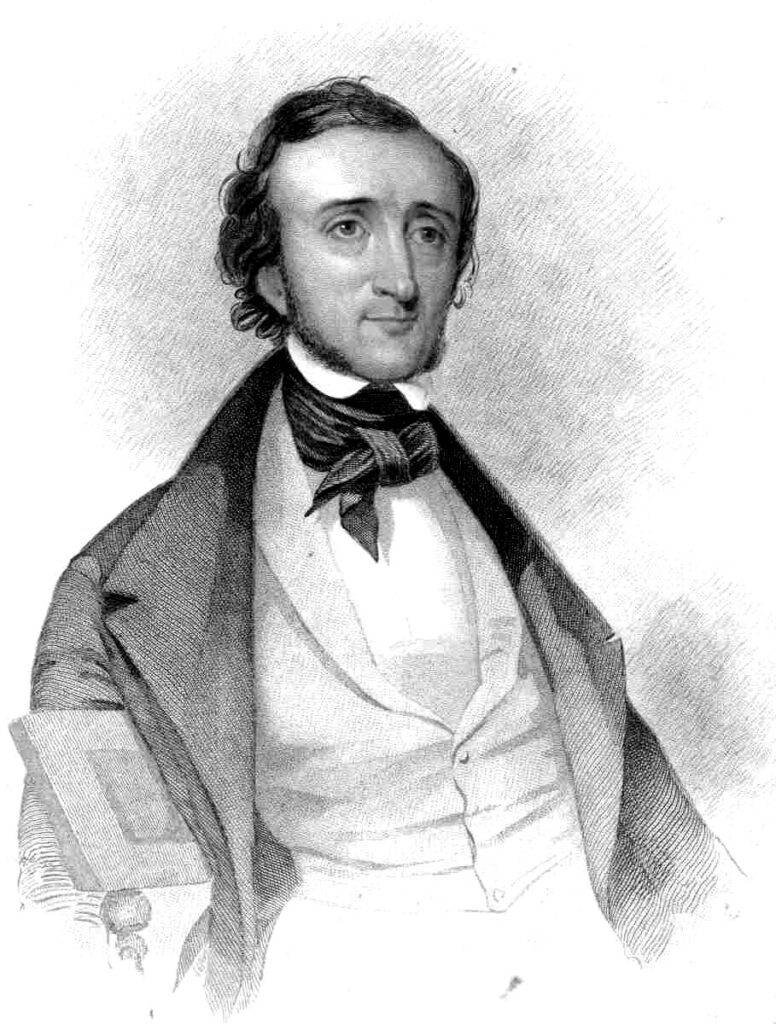Thou art the Man
I will now play the Œdipus to the Rattleborough enigma. I will expound to you — as I alone can — the secret of the enginery that effected the Rattleborough miracle — the one — the true — the admitted — the undisputed — the indisputable miracle which put a definite end to infidelity among the Rattleburghers, and converted to the orthodoxy of the grandames, all the carnal-minded who had ventured to be skeptical before.
This event — which I should be sorry to discuss in a tone of unsuitable levity — occurred in the summer of 18—. Mr Barnabas Shuttleworthy, one of the wealthiest and most respectable citizens of the borough, had been missing, for several days, under circumstances which gave rise to suspicion of foul play. Mr Shuttleworthy had set out from Rattleborough, very early one Saturday morning, on horseback, with the avowed intention of proceeding to the city of —— , about fifteen miles distant, and of returning the night of the same day. Two hours after his departure, however, his horse returned without him, and without the saddle-bags which had been strapped on his back at starting. The animal was wounded, too, and covered with mud. These circumstances naturally gave rise to much alarm among the friends of the missing man, and when it was found, on Sunday morning, that he had not yet made his appearance, the whole borough arose en masse, to go and look for his body.
The foremost and most energetic in instituting this search, was the bosom friend of Mr Shuttleworthy — a Mr Charles Goodfellow, or, as he was universally called, “Charley Goodfellow,” or “Old Charley Goodfellow.” Now whether it is a marvellous coincidence, or whether it is that the name itself has an imperceptible effect upon the character, I have never yet been able to ascertain — but the fact is unquestionable, that there never yet was any person named Charles, who was not an open, manly, honest, good-natured, and frank-hearted fellow, with a rich, clear voice, that did you good to hear it, and an eye that looked you always straight in the face, as much as to say “I have a clear conscience, myself, — am afraid of no man, — and am altogether above doing a mean action.” And thus all the hearty, careless, “walking gentlemen” of the stage, are very certain to be called Charles.
Now “Old Charley Goodfellow,” although he had been in Rattleborough not longer than six months, or thereabouts, and although nobody knew anything about him before he came to settle in the neighbourhood, had experienced no difficulty in the world in making the acquaintance of all the respectable people in the borough. Not a man of them but would have taken his bare word for a thousand at any moment; and, as for the women, there is no saying what they would not have done to oblige him. And all this came of his having been christened Charles, and of his possessing, in consequence, that ingenuous face which is proverbially the very “best letter of recommendation.”
I have already said that Mr Shuttleworthy was one of the most respectable, and, undoubtedly he was the most wealthy man in Rattleborough, while “Old Charley Goodfellow” was upon as intimate terms with him as if he had been his own brother. The two old gentlemen were next-door neighbours, and although Mr Shuttleworthy seldom, if ever, visited “Old Charley,” and never was known to take a meal in his house, still this did not prevent the two friends from being exceedingly intimate, as I have just observed; for “Old Charley” never let a day pass, without stepping in three or four times to see how his neighbour came on; and very often he would stay to breakfast, or tea; and almost always to dinner; and then the amount of wine that was made way with by the two cronies at a sitting, it would really be a difficult thing to ascertain. Old Charley’s favorite beverage was Chateau Margaux, and it appeared to do Mr Shuttleworthy’s heart good to see the old fellow swallow it, as he did, quart after quart; so that, one day, when the wine was in, and the wit, as a natural consequence, somewhat out, he said to his crony, as he slapped him upon the back — “I tell you what it is, Old Charley, — you are, by all odds, the heartiest old fellow I ever came across in all my born days; and, since you love to guzzle the wine at that fashion, I’ll be darned if I don’t have to make thee a present of a big box of the Chateau Margaux. Od rot me” (Mr Shuttleworthy had a sad habit of swearing, although he seldom went beyond “Od rot me,” or “By gosh,” or “By the jolly golly”) — “Od rot me” says he, “if I don’t send an order to town, this very afternoon, for a double box of the best that can be got — and I’ll make ye a present of it — I will — ye need’nt say a word, now — I will, I tell ye, and there’s an end of it; so look out for it — it will come to hand some of these fine days, precisely when ye are looking for it the least.” — I mention this little bit of liberality, on the part of Mr Shuttleworthy, just by way of showing you how very intimate an understanding existed between the two friends.
Well, on the Sunday morning in question, when it came to be fairly understood that Mr Shuttleworthy had met with foul play, I never saw any one so profoundly affected as Old Charley Goodfellow. When he first heard that the horse had come home without his master, and without his master’s saddle-bags, and all bloody from a pistol shot that had gone clean through and through the poor animal’s chest, without quite killing him; — when he heard all this, he turned as pale as if the missing man had been his own dear brother, or father, and shivered and shook all over, as if he had had a fit of the ague.
At first, he was too much overpowered with grief to be able to do anything at all, or to concert upon any plan of action — so that, for a long time, he endeavoured to dissuade Mr Shuttleworthy’s other friends from making a stir about the matter — thinking it best to wait a while — say for a week or two, or a month or two, to see if something would’nt turn up, or if Mr Shuttleworthy would’nt come in the natural way, and explain his reasons for sending his horse on before. I dare say you have often observed this disposition to temporize, or to procrastinate, in people who are laboring under any very poignant sorrow. Their powers of mind seem to be rendered torpid, so that they have a horror of anything like action, and like nothing in the world so well as to lie quietly in bed and “nurse their grief,” as the old ladies express it — that is to say, ruminate over their trouble.
The people of Rattleborough had, indeed, so high an opinion of the wisdom and discretion of “Old Charley” that the greater part of them felt disposed to agree with him, and not make a stir in the business “until something should turn up,” as the honest old gentleman worded it; and I believe that, after all, this would have been the general determination, but for the very suspicious interference of Mr Shuttleworthy’s nephew, a young man of very dissipated habits, and otherwise of rather bad character. This nephew — whose name was Pennifeather — would listen to nothing like reason, in the matter of “lying quiet,” but insisted upon making immediate search for the “corpse of the murdered man.” This was the expression he employed; and Mr Goodfellow acutely remarked, at the time, that it was “a singular expression, to say no more.” This remark of Old Charley’s, too, had great effect upon the crowd; and one of the party was heard to ask, very impressively, “how it happened that young Mr Pennifeather was so intimately cognizant of all the circumstances connected with his wealthy uncle’s disappearance, as to feel authorized to assert, distinctly and unequivocally, that his uncle was ‘a murdered man’.” Hereupon some little squibbing and bickering occurred, among various members of the crowd, and especially between “Old Charley” and Mr Pennifeather — although this latter occurrence was, indeed, by no means a novelty; for no good will had subsisted between the parties for the last three or four months; and matters had even gone so far that Mr Pennifeather had actually knocked down his uncle’s friend, for some alleged excess of liberty that the latter had taken in the uncle’s house, of which the nephew was an inmate. Upon this occasion “Old Charley” is said to have behaved with exemplary moderation and Christian charity. He arose from the blow, adjusted his clothes, and made no attempt at retaliation at all; — merely muttering a few words about “taking summary vengeance at the first convenient opportunity” — a natural and very justifiable ebullition of anger, — which meant nothing, however; and, beyond doubt, was no sooner given vent to than forgotten.
However these matters may be, (which have no reference to the point now at issue,) it is quite certain that the people of Rattleborough, principally through the persuasion of Mr Pennifeather, came, at length, to the determination of dispersing over the adjacent country, in search of the missing Mr Shuttleworthy. I say they came to this determination, in the first instance. After it had been fully resolved that a search should be made, it was considered almost a matter of course that the seekers should disperse — that is to say distribute themselves in parties — for the more thorough examination of the region round about. I forget, however, by what ingenious train of reasoning it was, that “Old Charley” finally convinced the assembly that this was the most injudicious plan that could be pursued. Convince them, however, he did — all except Mr Pennifeather — and, in the end, it was arranged that a search should be instituted carefully, and very thoroughly, by the burghers en masse; “Old Charley” himself leading the way.
As for the matter of that, there could have been no better pioneer than “Old Charley,” whom every body knew to have the eye of a lynx; but, although he led them into all manner of out-of-the-way holes and corners, by routes that nobody had ever suspected of existing in the neighbourhood; and although the search was incessantly kept up, day and night, for nearly a week, still no trace of Mr Shuttleworthy could be discovered. When I say no trace, however, I must not be understood to speak literally — for trace, to some extent, there certainly was. The poor gentleman had been tracked, by his horse’s shoes, (which were peculiar,) to a spot about three miles to the east of the borough, on the main road, leading to the city. Here the track made off into a by-path through a piece of woodland — this path coming out again into the main road and cutting off about half a mile of the regular distance. Following the shoe-marks down this lane, the party came, at length, to a pool of stagnant water, half hidden by the brambles to the right of the lane; and opposite this pool all vestige of the track was lost sight of. It appeared, however, that a struggle of some nature had here taken place, and it seemed as if some large and heavy body — much larger and heavier than a man — had been dragged from the by-path to the pool. This latter was carefully dragged, twice; but nothing was found; and the party were upon the point of going away, in despair of coming to any result, when Providence suggested to Mr Goodfellow the expediency of draining the water off altogether. This project was received with cheers, and many high compliments to “Old Charley” upon his sagacity and consideration. As many of the burghers had brought spades with them, supposing that they might possibly be called upon to disinter a corpse, the drain was easily and speedily effected; and no sooner was the bottom visible, than, right in the middle of the mud that remained, was discovered a black silk velvet waistcoat, which nearly every one present immediately recognized as the property of Mr Pennifeather. This waistcoat was much torn, and stained with blood; and there were several persons, among the party, who had a distinct remembrance of its having been worn by its owner on the very morning of Mr Shuttleworthy’s departure for the city; while there were others, again, ready to testify upon oath, if required, that Mr P. did not wear the garment in question, at any period during the remainder of that memorable day; — nor could any one be found to say that he had seen it upon Mr P.’s person at any period at all, subsequent to Mr Shuttleworthy’s disappearance.
Matters now wore a very serious aspect for Mr Pennifeather, and it was observed, as an indubitable confirmation of the suspicions which were excited against him, that he grew exceedingly pale, and when asked what he had to say for himself, was utterly incapable of saying a word. Hereupon, the few friends his riotous mode of living had left him, deserted him, at once, to a man, and were even more clamorous than his ancient and avowed enemies, for his instantaneous arrest. But, on the other hand, the magnanimity of Mr Goodfellow shone forth with only the more brilliant lustre, through contrast. He made a warm and intensely eloquent defence of Mr Pennifeather, in which he alluded, more than once, to his own sincere forgiveness of that wild young gentleman — “the heir of the worthy Mr Shuttleworthy” — for the insult which he (the young gentleman) had, no doubt in the heat of passion, thought proper to put upon him (Mr Goodfellow). “He forgave him for it,” he said, “from the very bottom of his heart; and, for himself, (Mr Goodfellow), so far from pushing the suspicious circumstances to extremity, which, he was sorry to say, really had arisen against Mr Pennifeather, he (Mr Goodfellow) would make every exertion in his power — would employ all the little eloquence in his possession — to — to — to — soften down, as much as he could conscientiously do so, the worst features of this really exceedingly perplexing piece of business.”
Mr Goodfellow went on, for some half hour longer, in this strain, very much to the credit both of his head and of his heart; but your warm-hearted people are seldom apposite in their observations; — they run into all sorts of blunders, contre-temps and mal à propos -isms, in the hot-headedness of their zeal to serve a friend; thus, often, with the kindest intentions in the world, doing infinitely more to prejudice his cause, than to advance it.
So, in the present instance, it turned out with all the eloquence of “Old Charley”; for, although he laboured earnestly in behalf of the suspected, yet it so happened, somehow or other, that every syllable he uttered of which the direct but unwitting tendency was not to exalt the speaker in the good opinion of his audience, had the effect to deepen the suspicion already attached to the individual whose cause he pleaded, and to arouse against him the fury of the mob.
One of the most unaccountable errors committed by the orator, was his allusion to the suspected, as “the heir of the worthy old gentleman, Mr Shuttleworthy.” The people had really never thought of this before. They had only remembered certain threats of disinheritance uttered, a year or two previously, by the uncle (who had no living relative except the nephew); and they had, therefore, always looked upon this disinheritance as a matter that was settled — so single-minded a race of beings were the Rattleburghers; — but the remark of “Old Charley” brought them at once to a consideration of this point, and thus gave them to see the possibility of the threats having been nothing more than a threat. And straightway, hereupon, arose the natural question of cui bono? — a question that tended, even more than the waistcoat, to fasten the terrible crime upon the young man. And here, lest I be misunderstood, permit me to digress, for one moment, merely to observe that the exceedingly brief and simple Latin phrase which I have employed, is invariably mistranslated and misconceived. “Cui bono”, in all the crack novels, and elsewhere, — in those of Mrs Gore, for example (the author of “Cecil”) a lady who quotes all tongues from the Chaldæan to Chickasaw, and is helped to her learning, “as needed,” upon a systematic plan, by Mr Beckford; — in all the crack novels, I say, from those of Bulwer and Dickens, to those of Turnapenny and Ainsworth, the two little Latin words cui bono, are rendered “to what purpose,” or, (as if quo bono) , “to what good.” Their true meaning, nevertheless, is “for whose advantage.” Cui, to whom; bono, is it for a benefit. It is a purely legal phrase, and applicable precisely in cases such as we have now under consideration, where the probability of the doer of a deed, hinges upon the probability of the benefit accruing to this individual, or to that, from the deed’s accomplishment. Now, in the present instance, the question, cui bono, very pointedly implicated Mr Pennifeather. His uncle had threatened him, after making a will in his favor, with disinheritance. But the threat had not been actually kept; the original will, it appeared, had not been altered. Had it been altered, the only supposable motive for murder, on the part of the suspected, would have been the ordinary one of revenge; and even this would have been counteracted by the hope of reinstation into the good graces of the uncle. But, the will being unaltered, while the threat to alter remained suspended over the nephew’s head, there appears, at once, the very strongest possible inducement for the atrocity: and so concluded, very sagaciously, the worthy citizens of the borough of Rattle.
Mr Pennifeather was, accordingly, arrested upon the spot; and the crowd, after some farther search, proceeded homewards, having him in custody. On the route, however, another circumstance occurred, tending to confirm the suspicion entertained. Mr Goodfellow, whose zeal led him to be always a little in advance of the party, was seen suddenly to run forward a few paces, stoop, and then, apparently, to pick up some small object from the grass. Having quickly examined it, he was observed, too, to make a sort of half attempt at concealing it in his coat-pocket; but this action was noticed, as I say, and consequently prevented; when the object picked up was found to be a Spanish knife, which a dozen persons at once recognized as belonging to Mr Pennifeather. Moreover, his initials were engraved upon the handle. The blade of this knife was open, and bloody.
No doubt now remained of the guilt of the nephew, and, immediately upon reaching Rattleborough, he was taken before a magistrate for examination.
Here matters again took a most unfavourable turn. The prisoner, being questioned as to his whereabouts on the morning of Mr Shuttleworthy’s disappearance, had absolutely the audacity to acknowledge that, on that very morning, he had been out with his rifle, deer-stalking, in the immediate neighbourhood of the pool where the blood-stained waistcoat had been discovered, through the sagacity of Mr Goodfellow.
This latter now came forward, and, with tears in his eyes, asked permission to be examined. He said that stern sense of the duty he owed to his Maker, not less than to his fellow men, would permit him no longer to remain silent. Hitherto, the sincerest affection for the young man (notwithstanding the latter’s ill treatment of himself, Mr Goodfellow), had induced him to make every hypothesis which imagination could suggest, by way of endeavoring to account for what appeared suspicious, in the circumstances that told so seriously against Mr Pennifeather; — but these circumstances were now altogether too convincing — too damning; — he would hesitate no longer; — he would tell all he knew — although his heart (Mr Goodfellow’s) should absolutely burst asunder in the effort. He then went on to state that, on the afternoon of the day previous to Mr Shuttleworthy’s departure for the city, that worthy old gentleman had mentioned to his nephew, in his hearing (Mr Goodfellow’s), that his object in going to town on the morrow, was to make a deposit of an unusually large sum of money, in the “Farmer’s and Mechanics’ Bank”; and that, then and there, the said Mr Shuttleworthy had distinctly avowed to the said nephew, his irrevocable determination of rescinding the will originally made, and of cutting him off with a shilling. He, (the witness), now solemnly called upon the accused to state whether what he, (the witness), had just stated, was, or was not, the truth, in every substantial particular. Much to the astonishment of every one present, Mr Pennifeather frankly admitted that it was.
The magistrate now considered it his duty to send a couple of constables to search the chamber of the accused, in the house of his uncle. From this search they almost immediately returned, with the well-known, steel-bound, russet-leather pocket-book, which the old gentleman had been in the habit of carrying for years. Its valuable contents, however, had been abstracted; and the magistrate in vain endeavoured to extort from the prisoner the use which had been made of them, or the place of their concealment. Indeed he obstinately denied all knowledge of the matter. The constables also discovered, between the bed and sacking of the unhappy man, a shirt and neck-handkerchief, both marked with the initials of his name, and both hideously besmeared with the blood of the victim.
At this juncture, it was announced that the horse of the murdered man had just expired in the stable from the effects of the wound he had received, and it was proposed by Mr Goodfellow, that a post mortem examination of the beast should be immediately made, with the view, if possible, of discovering the ball. This was accordingly done; and, as if to demonstrate, beyond a question, the guilt of the accused, Mr Goodfellow, after considerable searching in the cavity of the chest, was enabled to detect, and to pull forth, a bullet of very extraordinary size, which, upon trial, was found to be exactly adapted to the bore of Mr Pennifeather’s rifle, while it was far too large for that of any other person in the borough, or its vicinity. To render the matter even surer yet, however, this bullet was discovered to have a flaw, or seam, at right angles to the usual suture; and, upon examination, this seam corresponded precisely with an accidental ridge, or elevation, in a pair of moulds, acknowledged by the accused himself to be his own property. Upon the finding of this bullet, the examining magistrate refused to listen to any farther testimony, and immediately committed the prisoner for trial; declining, resolutely, to take any bail in the case; although against this severity Mr Goodfellow very warmly remonstrated, and offered to become surety in whatever amount might be required. This generosity on the part of “Old Charley,” was only in accordance with the whole tenor of his amiable and chivalrous conduct, during the entire period of his sojourn in the borough of Rattle. In the present instance, the worthy man was so entirely carried away by the excessive warmth of his sympathy, that he seemed to have quite forgotten, when he offered to go bail for his young friend, that he himself (Mr Goodfellow) did not possess a single dollar’s worth of property upon the face of the earth.
The result of the committal may be readily foreseen. Mr Pennifeather, amid the loud execrations of all Rattleborough, was brought to trial at the next Criminal Sessions; when the chain of circumstantial evidence, (strengthened, as it was, by some additional damning facts, which Mr Goodfellow’s sensitive conscientiousness forbade him to withhold from the court), was considered so unbroken and so thoroughly conclusive, that the jury, without leaving their seats, returned an immediate verdict of “Guilty of Murder in the First Degree.” Soon afterwards the unhappy wretch received sentence of death, and was remanded to the county jail, to await the inexorable vengeance of the Law.
In the meantime, the noble behaviour of “Old Charley Goodfellow” had doubly endeared him to the honest citizens of the borough. He became ten times a greater favorite than ever; and, as a natural result of the hospitality with which he was treated, he relaxed, as it were, perforce, the extremely parsimonious habits which his poverty had hitherto impelled him to observe, and very frequently had little réunions at his own house, when wit and jollity reigned supreme — dampened a little, of course, by the occasional remembrance of the untoward and melancholy fate which impended over the nephew of the late lamented bosom friend of the generous host.
One fine day, this magnanimous old gentleman was agreeably surprized at the receipt of the following letter:
Chat. Mar. A — No. 1 — 6 Doz. Bottles (1/2 Gross).
From H. F. B. & co.
Charles Goodfellow, Esq., Rattleborough.
Charles Goodfellow, Esquire,
Dr Sir,
In conformity with an order transmitted to our firm, about two months since, by our esteemed correspondent, Mr Barnabus Shuttleworthy, we have the honor of forwarding, this morning, to your address, a double box of Chateau-Margaux, of the antelope brand, violet seal. Box numbered and marked as per margin.
We remain, Sir,
Yr. mo. ob. sts,
Hoggs, Frogs, Bogs & co.
==================
City of —, June 21rst, 18—.
P.S. — The box will reach you, by wagon, on the day after your receipt of this letter. Our respects to Mr Shuttleworthy.
H. F. B. & co.
The fact is that Mr Goodfellow had, since the death of Mr Shuttleworthy, given over all expectation of ever receiving the promised Chateau-Margaux; and he, therefore looked upon it, now, as a sort of especial dispensation of Providence in his behalf. He was highly delighted, of course; and, in the exuberance of his joy, invited a large party of friends to a petit souper, on the morrow, for the purpose of broaching the good old Mr Shuttleworthy’s present. Not that he said anything about “the good old Mr Shuttleworthy” when he issued the invitations. The fact is, he thought much, and concluded to say nothing at all. He did not mention to any one — if I remember aright — that he had received a present of Chateau-Margaux. He merely asked his friends to come and help him to drink some, of a remarkably fine quality, and rich flavor, that he had ordered up from the city, a couple of months ago, and of which he would be in the receipt upon the morrow. I have often puzzled myself to imagine why it was that “Old Charley” came to the conclusion to say nothing about having received the wine from his old friend — but I could never precisely understand his reason for the silence — although he had some excellent and very magnanimous reason, no doubt.
The morrow at length arrived, and, with it, a very large and highly respectable company at Mr Goodfellow’s house. Indeed, half the borough was there — I myself among the number — but, much to the vexation of the host, the Chateau-Margaux did not arrive until a late hour, and when the sumptuous supper, supplied by “Old Charley”, had been done very ample justice by the guests. It came at length, however, — a monstrously big box of it there was, too, — and as the whole party were in excessively good humour, it was decided, nem: con:, that it should be lifted upon the table, and its contents disembowelled forthwith.
No sooner said than done. I lent a helping hand; and, in a trice, we had the box upon the table, in the midst of all the bottles and glasses, not a few of which were demolished in the scuffle. “Old Charley,” who was pretty much intoxicated, and excessively red in the face, now took a seat, with an air of mock dignity, at the head of the board, and thumped furiously upon it with a decanter, calling upon the company to keep order “during the ceremony of disinterring the treasure.”
After some vociferation, quiet was, at length, fully restored, and, as very often happens in similar cases, a profound and remarkable silence ensued. Being then requested to force open the lid, I complied, of course, “with an infinite deal of pleasure.” I inserted a chisel, and, giving it a few slight taps with a hammer, the top of the box flew suddenly and violently off, and, at the same instant, there sprang up into a sitting position, directly facing the host, the bruised, bloody, and nearly putrid corpse of the murdered Mr Shuttleworthy himself. It gazed, for a few moments, fixedly and sorrowfully, with its decaying and lack-lustre eyes, full into the countenance of Mr Goodfellow; uttered slowly, but clearly and impressively, the words “Thou art the Man!”; and then, falling over the side of the chest, as if thoroughly satisfied, stretched out its limbs, quiveringly, upon the table.
The scene that ensued is altogether beyond description. The rush for the doors and windows was terrific, and many of the most robust men in the room fainted, outright, through sheer horror. But after the first wild, shrieking burst of affright, all eyes were directed to Mr Goodfellow. If I live a thousand years, I can never forget the more than mortal agony which was depicted in that ghastly face of his, so lately rubicund with triumph and wine. For several minutes, he sat rigidly as a statue of marble; his eyes seeming, in the intense vacancy of their gaze, to be turned inwards, and absorbed in the contemplation of his own miserable, murderous soul. At length, their expression appeared to flash suddenly out into the external world; when, with a quick leap, he sprang from his chair, and falling heavily with his head and shoulders upon the table, and in contact with the corpse, poured out, rapidly and vehemently, a detailed confession of the hideous crime for which Mr Pennifeather was then imprisoned and doomed to die.
What he recounted, was, in substance, this: — He followed his victim to the vicinity of the pool; there shot his horse with a pistol; despatched the rider with its butt-end; possessed himself of the pocket book; and, supposing the horse dead, dragged it, with great labor, to the brambles by the pond. Upon his own beast he slung the corpse of Mr Shuttleworthy, and thus bore it to a secure place of concealment, a long distance off, through the woods.
The waistcoat, the knife, the pocket-book, and the bullet, had been placed by himself where found, with the view of avenging himself upon Mr Pennifeather. He had also contrived the discovery of the stained handkerchief and shirt.
Towards the end of the blood-chilling recital, the words of the guilty wretch faltered, and grew hollow. When the record was finally exhausted, he arose, staggered backwards from the table, and fell, dead.
———————————
The means by which this happily-timed confession was extorted, although efficient, were simple indeed. Mr Goodfellow’s excess of frankness had disgusted me, and excited my suspicion, from the first. I was present when Mr Pennifeather had struck him; and the fiendish expression which then arose upon his countenance, although momentary, assured me that his threat of vengeance would, if possible, be rigidly fulfilled. I was thus prepared to view the manœuvering of “Old Charley” in a very different light from that in which it was regarded by the good citizens of Rattleborough. I saw, at once, that all the criminating discoveries arose, either directly or indirectly, from himself. But the fact which clearly opened my eyes to the true state of the case, was the affair of the bullet, found by Mr G. in the carcass of the horse. I had not forgotten, although the Rattleburghers had, that there was a hole where the ball had entered the horse, and another where it went out. If it were found in the animal, then, after having made its exit, I saw clearly that it must have been deposited by the person who found it. The bloody shirt and handkerchief confirmed the idea suggested by the bullet; for the blood, upon examination, proved to be capital claret, and no more. When I came to think of these things, and also of the late increase of liberality and expenditure on the part of Mr Goodfellow, I entertained a suspicion which was none the less strong ,because I kept it altogether to myself.
In the meantime, I instituted a rigorous private search for the corpse of Mr Shuttleworthy, and, for good reasons, searched in quarters as divergent as possible from those to which Mr Goodfellow conducted his party. The result was that, after some days, I came across an old dry well, the mouth of which was nearly hidden by brambles; — and here, at the bottom, I discovered what I sought.
Now it so happened that I had overheard the colloquy between the two cronies, when Mr Goodfellow had contrived to cajole his host into the promise of a box of Chateau Margaux. Upon this hint I acted. I procured a stiff piece of whalebone, thrust it down the throat of the corpse, and deposited the latter in an old wine-box; taking care so to double the body up, as to double the whalebone with it. In this manner, I had to press forcibly upon the lid to keep it down, while I secured it with nails; and I anticipated, of course, that as soon as these latter were removed, the top would fly off, and the body fly up.
Having thus arranged the box, I marked, numbered, and addressed it, as already told; and then, writing a letter in the name of the wine merchants with whom Mr Shuttleworthy dealt, I gave instructions to my servant to wheel the box to Mr Goodfellow’s door, in a barrow, at a given signal from myself. For the words which I intended the corpse to speak, I confidently depended upon my ventriloquial abilities; for their effect, I counted upon the conscience of the murderous wretch.
I believe there is nothing more to be explained. Mr Pennifeather was released upon the spot, inherited the fortune of his uncle, profited by the lessons of experience, turned over a new leaf, and led happily, ever afterwards, a new life.
Edgar Allan Poe
Originally published in 1844
